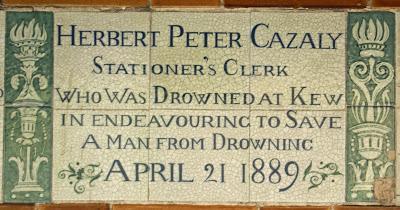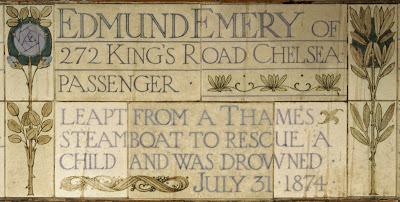
Boating also posed its own risks, especially given the high volume of river traffic in the nineteenth century: we saw how Ernest Benning died after his boat capsized, while the Rev Garnish perished attempting to rescue the victims of a boating collision. A similar incident was that in which Herbert Peter Cazaly drowned. A thirty-year-old stationer's clerk, he was out with a friend rowing their boat on the Thames when he saw two boats almost collide. A man in one of the boats raised his oars, overbalancing the boat which capsized. He and his companion were thrown into the river; one of them clung onto the upturned boat but the other, a non-swimmer, was in real difficulties. Cazaly jumped in to rescue him, but the panicked man pulled him under and both were drowned.
HERBERT PETER CAZALY STATIONER'S CLERK WHO WAS DROWNED AT KEW IN ENDEAVOURING TO SAVE A MAN FROM DROWNING, APRIL 21 1889.
Even the riverbank was not reliably safe. A boy playing on the bank at Westminster fell into the water. 21-year-old Edward Emery (whose first name is incorrect on the memorial) jumped into the water from a passing paddle-steamer, in an attempt at rescue. The boy survived but Emery, caught in strong currents, did not. The Watts Memorial records not only his bravery, but also his precise address:
EDMUND EMERY OF 272 KING'S ROAD CHELSEA, PASSENGER, LEAPT FROM A THAMES STEAMBOAT TO RESCUE A CHILD AND WAS DROWNED JULY 31 1874.


